#og sir john franklin
Explore tagged Tumblr posts
Text


Sir John Franklin to Lady Jane Franklin:

James Fitzjames to John Barrow Jr. (x) :

LOVE the juxtaposition between these letters, these men are having very different experiences
#james fitzjames#sir john franklin#francis crozier#the franklin expedition#the terror#the terror fanart#polar history#polar exploration#polar exploration fanart#james fitzjames fanart#my drawings#may we be spared to meet on earth#<- the letter book#my beloved#john barrow jr#polar explorer fanart#lady jane franklin#jane franklin#john franklin#og francis crozier#og james fitzjames#historical francis crozier#historical james fitzjames#og sir john franklin#historical sir john franklin#historical john franklin#polar explorers
571 notes
·
View notes
Text
sir john if he slayed

#felt bad tagging the og post with this when i originally saw it so. i screenshotted it#the terror#sir john franklin
22 notes
·
View notes
Text
AMC The Terror (2018); Ep 1 "Go For Broke"

#the terror#amc the terror#james fitzjames#francis crozier#sir john franklin#DID I JUST REBLOG THAT OG MEME THEN THINK OF THIS?? YES!!#meme
64 notes
·
View notes
Text
Top Ten Historical Figures Done Dirty by The Terror (2018)
So, we all know and love Dave Kajganich and Soo Hugh’s beautiful show, right? Of course. But it’s important to set the historical record straight, especially when there are real people’s life-stories and legacies on the line.
(NOTE: this list is biased heavily toward upper-class individuals because the historical record does a better job preserving those voices for us. Was the real Cornelius Hickey as nasty a person in real life as he was in the show? Almost certainly not – which is why we’re given “E.C.” as a nod to the fact that we shouldn’t assume these characters represent real historical villains, even when the narrative makes them antagonists; HOWEVER, not everyone in the show was given the same courtesy as the OG “Cornelius Hickey.” Which is why this post exists – to show you the best sides of some people you might not otherwise appreciate for their full humanity. That being said, keep in mind the sources used – and, for instance, who has surviving portraits and who doesn’t.)
Thus, below the cut, I give you this list, (mostly) in order from #10 (honorable mention, only somewhat slandered) to #1 (most hideously maligned) – my list of characters from The Terror who deserved better.
(Please don’t take this too seriously – I know there are reasons why choices had to be made in order to make this show work on television, and I do very much love the end product. But I also genuinely think it’s a good idea to remember the real people behind these characters, and think critically about how we depict them ourselves.)
Bottom Tier – The Overlooked Men of the Franklin Expedition
#10. Richard Wall – & – John Diggle
We’re combining these two because they had a lot in common, historically speaking! Both were polar veterans, having served as a Cook (Wall) and an AB-then-Quartermaster (Diggle) on HMS Erebus under the command of Sir James Clark Ross in the Antarctic expedition of 1839-1843. Certainly we do get some good scenes with them in the show, but there was plenty more to explore there – for instance, Captain Ross was apparently so taken with Richard Wall that he hired him on as a private cook after the Antarctic expedition. (One imagines that Sir James may have regretted letting his friends of the Franklin expedition steal Wall out from under him.)
(If you want some more information on Diggle, the brilliant @handfuloftime found this excellent article on him – fun facts include the detail that Diggle’s only daughter bore the name Mary Ann Erebus Diggle.)
#9. John Smart Peddie
Now, I don’t think we should go as far as the Doctor Who Audio Drama adaptation of the Franklin Expedition, which makes Peddie into Francis Crozier’s oldest friend, someone “almost like a brother” to Crozier (no evidence of ANY prior relationship between the two existed, contrary to whatever the Doctor Who Audio Dramas would have you believe!) but Peddie probably earned his place as chief surgeon, however fond we may all be of the beautiful Alex “Macca” MacDonald, who was, in fact, the Assistant Surgeon, historically speaking. It’s hard to find information about Peddie, but someone should go looking! I want to know about this man!
(If you want to know more about the historical Alexander MacDonald, there’s a short biographical article on him from Arctic that you can read here.)
#8 James Walter Fairholme
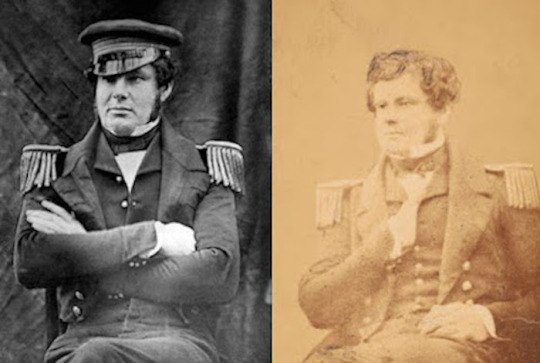
The only one of the expedition’s lieutenants who doesn’t really get any characterization in the show, which is a travesty! The historical Fairholme (pronounced “Fairem”) was, as they say, a himbo, and the letters that he wrote home to his father are positively precious. He loved the expedition pets (lots of kisses for Neptune!), and he needed two kayaks because he couldn’t fit into just one with his beefy thighs. Fitzjames loaned him a coat when all the Erebus officers had their portraits taken, and then called him a “smart, agreeable companion, and a well informed man,” and Goodsir singled Fairholme out as “very much interested” in the work of naturalist observations. Just a lovely young man who could have gotten some screen time, you know?
(Also, as @transblanky discovered, four separate members of the Fairholme family gave money to Thomas Blanky’s widow when she was struggling financially in the 1850s, making them, combined, the most generous contributor to her subscription.)
Middle Tier – Franklin’s Men Who Didn’t Deserve That
#7. William Gibson
Alright, I want to talk about how uniquely horrible the show’s William Gibson is: this is a character willing to lie and accuse his partner of sexual assault that didn’t happen. I get there were extenuating circumstances, but if I were a historical figure who died in some famous disaster and someone depicted me doing something like that? Let’s just say I’m deeply offended on the real Gibson’s behalf.
What do we know about the historical William Gibson? Not much – but we know a little. Gibson’s younger brother served on an overland exploratory venture across Australia in the 1870s… from which he never returned. (God, the Gibson family had the worst luck?) This description of a conversation that young Alf Gibson had with expedition leader Ernest Giles only days before his death is VERY eerie:
[Gibson] said, “Oh! I had a brother who died with Franklin at the North Pole, and my father had a deal of trouble to get his pay from government.” He seemed in a very jocular vein this morning, which was not often the case, for he was usually rather sulky, sometimes for days together, and he said, “How is it, that in all these exploring expeditions a lot of people go and die?”
I said, “I don't know, Gibson, how it is, but there are many dangers in exploring, besides accidents and attacks from the natives, that may at any time cause the death of some of the people engaged in it; but I believe want of judgment, or knowledge, or courage in individuals, often brought about their deaths. Death, however, is a thing that must occur to every one sooner or later.”
To this he replied, “Well, I shouldn't like to die in this part of the country, anyhow.” In this sentiment I quite agreed with him, and the subject dropped.
(From Giles’s Australia Twice Traversed which you can read here)
Beyond that, one thing we do know is that William Gibson was probably friends with Henry Peglar – they had served on ships together before, and Gibson may possibly have been the poor fellow found cradling the Peglar Papers, according to researcher Glenn Stein. So we might imagine the historical Gibson as a much kinder man than the show’s depiction of him – this was someone who befriended the clever, playful Peglar we all know and love from the transcriptions of his papers, so full of poetry and linguistic jokes. It’s a shame we didn’t get a chance to meet this real Gibson, who actually knew the Henry Peglar whom we love so well.
#6. Stephen Stanley
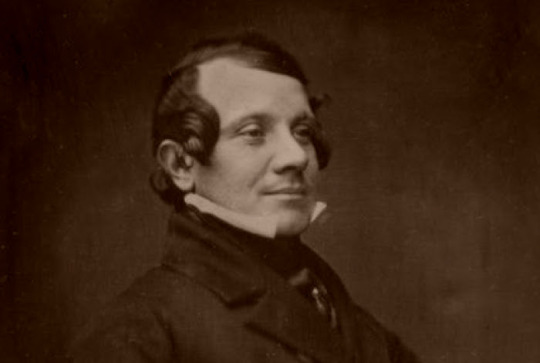
Look. There’s that one famous line in James Fitzjames’s letters to the Coninghams about how Stanley went about with his “shirt sleeves tucked up, giving one unpleasant ideas that he would not mind cutting one’s leg off immediately – ‘if not sooner.’” And certainly Harry Goodsir had some mixed opinions of the man, saying was “a would be great man who as I first supposed would not make any effort at work after a time,” and that he “knows nothing whatever about subject & is ignorant enough of all other subjects,” whatever…. that means….
But Fitzjames also had some rather nicer things to say about him, that he was “thoroughly good natured and obliging and very attentive to our mess.” Also, the amputation comment? Very likely had a quite positive underlying joke to it – Stanley may not have been much of a naturalist, but he was actually an accomplished anatomist, who won a prize for dissection in 1836, on account of his “bend of the elbow,” which was “a picture of dissection,” according to Henry Lonsdale, who also called Stanley his “facetious friend” and “a fine fellow” (Lonsdale 1870, pg. 159). So, the real Stanley probably was rather droll, but the perpetually cruel Stanley of the show misses some of the real man’s major historical virtues and replaces them with historically unlikely mass-mercy-murder.
#5. John Irving
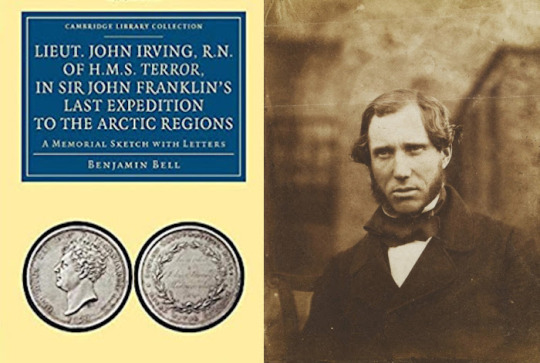
Now we’re getting into the territory of characters who did get some good development, but are missing a bit of historical nuance. As I’m sure many of you know, the historical Irving was indeed very religious, but the flashes of anger (i.e. against Manson) we see from Irving in the show don’t seem terribly consistent with the Irving depicted in this memorial volume, where John seems more like a quiet, bookish, mathematically inclined young man, with a self-deprecating sense of humor and a gentle sweetness. It’s really not at all far off from the version of Irving we see with Kooveyook in the show – I just wish we could have seen more of that side of Irving.
Top Tier – The Triumvirate of Polar Friends
So, these three DO have many good things to recommend them in the show, but because I’ve done such deep research on them, it can be quite jarring to watch certain scenes in which they behave contrary to their historical personalities, and I find myself pausing when watching the show with friends or family to explain that NO, they wouldn’t do that!
#4. Sir James Clark Ross
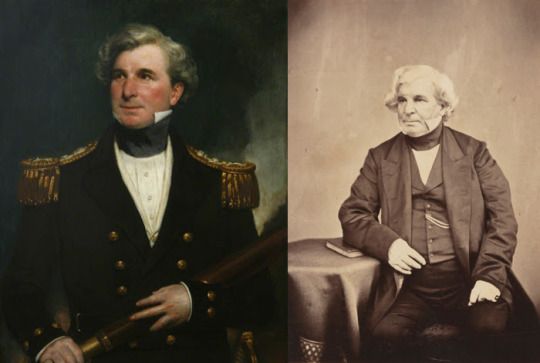
First thing – we LOVE Richard Sutton. He did a beautiful job with the material given to him. (This is true of all the actors on the list, frankly, but it’s doubly true here.) But that scene at the Admiralty where Sir James tells Lady Franklin “I have many friends on those ships, as you know,” to shut down her argument for search missions? At that time (aka 1847), historically, Sir James Clark Ross was actively campaigning for search missions, planning routes and volunteering his services in command of any vessel the Admiralty even vaguely contemplated sending out. You could see this real-life desperation in Sir James’s morose attention to his whiskey glass in that scene if you’re really trying, but I think the more historically responsible thing would have been to make vividly clear that James Ross risked life and limb, as soon as he possibly could, to try to rescue Franklin and Crozier and Blanky, men he’d known and cared about and bitterly missed – and, in the case of Crozier, “truly loved.”
#3. Sir John Franklin
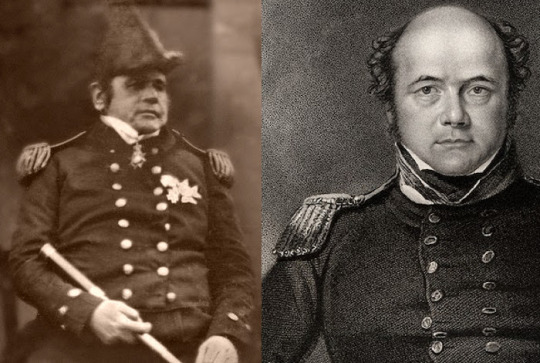
The historical Franklin had plenty of flaws – his contributions to British colonial rule certainly harmed no small number of people, and we should question the way that heroic statues of Franklin are some of the only memorials that serve to honor the lives lost on Franklin’s expeditions – especially considering the steep body count of not only Franklin’s final voyage, but his previous missions in Arctic regions as well. (DM me and I’ll scream at you about counter-monuments! Is this a promise or a threat? Who knows!) With that said, most contemporary accounts agree that Sir John Franklin treated his friends, his family, and those within his social orbit with kindness, and his cruelties were systemic, not personal. In this light, the image of Sir John viciously tearing into Francis Crozier’s vulnerabilities in the show feels very off. Though there was certainly some friction over Crozier’s two proposals to Sophia Cracroft, historically speaking, there’s no evidence at all that Sir John discouraged her from marrying Francis – Sophia may have had many reasons of her own (*clears throat meaningfully in a lesbian sort of way*) for not accepting any of the several marriage proposals offered to her (from Crozier as well as from others), and we ought to keep in mind that she remained unmarried all her life. The notion that the real Sir John would have considered Crozier too low-born or too Irish to be part of the Franklin family isn’t grounded in historical fact.
#2. Lady Jane Franklin
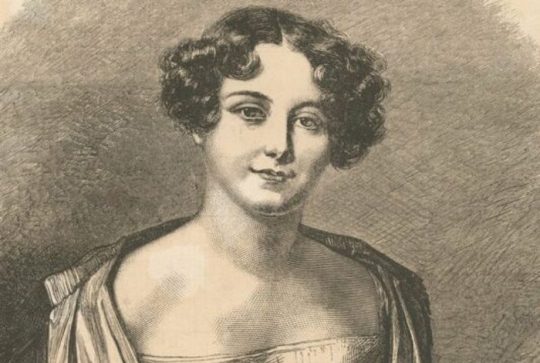
Again disclaimer: the real Lady Franklin left behind a legacy with much to critique. Those who rightfully point out the racism of her treatment of the young indigenous Tasmanian girl Mathinna should be fully heard out. Observations of her own contributions to imperialism are important and valid. Though I tend to see her feud with Dr. John Rae as somewhat understandable – given that Lady Franklin didn’t have the benefit of our hindsight knowing Rae was correct – the levels of prejudice that she enabled and even encouraged in the writing of Charles Dickens when he attempted to discredit Inuit accounts of Franklin’s fate are inarguably deplorable. These things being said, everything noted for Sir John re: Sophia Cracroft goes for Lady Franklin as well – there’s no reason to imagine a scene where Jane would bully Francis Crozier within an inch of his life, seconds after a failed second proposal, when, historically, Lady Franklin felt the situation was so delicate that it required the quiet and compassionate intervention of Sir James Clark Ross, a dearly loved mutual friend to all parties. Tension does not imply aggression; conflict is not abuse. We know this can’t have been an easy experience for the historical Francis Crozier, but the picture is a lot more complicated than what can be shown in one small subplot of a ten-episode television show. Because of this complexity, however, Lady Franklin’s social deftness suffers in the show. (I could also write an entire essay about Jane Franklin’s last shot in the show, at the beginning of Episode 9: The C the C the Open C – TL;DR is that framing is very important, and, at the very last moment, the show reframes Lady Franklin as a mutilated corpse, a speaking mouth without a brain, which is….. a choice.)
And, at number 1, the person done most dirty by The Terror (2018) is….
#1. Charles Frederick “Freddy” Des Voeux
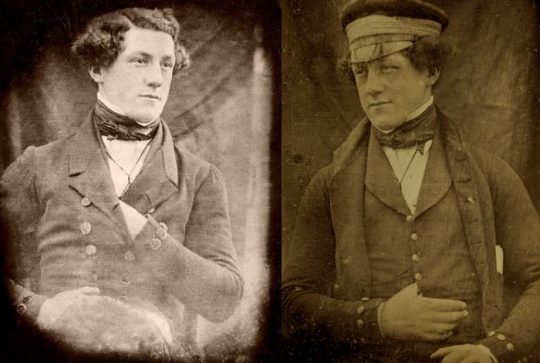
Look. I’m biased here because I am fed daily information about the historical Freddy Des Voeux from @frederickdesvoeux so I’ve become, I think understandably, a bit attached.
But this is very plainly the clearest cruelty the show does to a historical figure – the historical Des Voeux was a very young man (only around 20 when the ships set sail) known always as “Frederick or Freddy” to his family, and described by all parties as bright and sweet – Fitzjames said that he was “a most unexceptionable, clever, agreeable, light-hearted, obliging young fellow, and a great favourite of Hodgson’s, which is much in his favour besides,” and described him cheerfully helping to catch specimens for Goodsir. Des Voeux is named “dear” by Captain Osborn in Erasmus Henry Brodie’s 1866 poem on the Franklin Expedition (43) and Leo McClintock reported the young man’s well-known “intelligence, gallantry, and zeal” in his 1869 update to his account of the Franklin Expedition’s fate (xlii). None of this is consistent with Des Voeux’s behaviour in the show, especially in the later episodes.
To reduce Des Voeux to an easily-detested figure, over whose death one might cheer, is not a kindness – the creation of a narrative where his death is satisfying does damage to the memory of a real person, a barely-more-than-teenager who died in the cold of the Arctic and left behind only scraps of a shirt and a spidery signature in the bottom margin of a fragmentary document.
Television shows may need their villains, but it’s important to remember that real life isn’t like that. Surely the historical Frederick Des Voeux was most likely not a perfect person, and, as an upper class officer contributing to a British imperial project, he does bear some responsibility for the harm done by the Franklin expedition, but it’s not accurate to assume he was any less worthy of sympathy than the other officers who considered him a friend – those men whom we now venerate, like James Fitzjames. So as far as I’m concerned, Freddy Des Voeux deserves at least as much consideration, care, and compassion from us.
204 notes
·
View notes